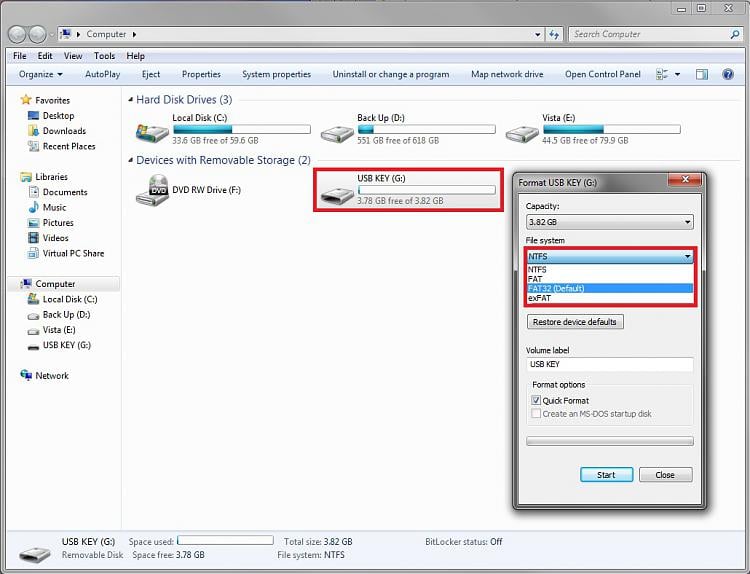Format Usb Ntfs Windows 10
You may notice the headline here is that you can easily create bootable install media for old and new PCs, but they're not all alike. That's right. For older stuff, it's NTFS on an MBR. For newer stuff, like the SP3 (Surface Pro 3), it's FAT32 on GPT, a requirement Microsoft documents here. Huh? It just means this: if you intend to do fresh/clean installs (not upgrades) on both older and newer PCs, you may need to create 2 separate bootable installer USB flash drives. No biggie. Note: the OS still goes to your SSD or HDD.
Windows 10, similar to its predecessors, continues to use NTFS as the default file system, which is one of the most popular feature-rich file system in use today.
Once the ISO file is downloaded, the whole process of following these instructions will likely take you well under 10 minutes. In other words, it's simpler to do than it sounds. These instructions also likely apply to Windows Server 10 as well, and are intended for an intermediate audience that is comfortable with testing operating systems, and know that protecting and backing up your data is your responsibility.
Twin Star Exorcists. Mayura-chan's Secret – MAYURA'S SECRET LESSON. TV-14| HD (1080p)| 2016. Available Languages: English. Twin star exorcist episode 1.
If you have issues with trying to boot from media you created with the venerable Microsoft Windows 7 USB/DVD Download Tool, such as a Surface Pro 3, then this article's alternative approach might be for you. A single free tool that can make bootable Windows install media for any PC.
Prerequisites
- A PC running Windows 7 or later
- An 8GB USB flash drive that'll be completely overwritten, ideally USB 3.0 for better speed
Download
Windows 10 Installation Usb Format Ntfs
A. Latest Windows 10 ISO
Windows 10 Technical Preview (x64) - Build 10162
This includes international versions, and you can actually skip signing up for the Windows Insider Program and go right to the download selections:
You can actually skip signing up for the Windows Insider Program and go right to the download. If it happens to be the English 64 bit version that you're hankering for, here's the direct link:
Windows10_InsiderPreview_x64_EN-US_10162.iso
B. Rufus
Download Rufus from here, if you'd like to create bootable installation media. The portable version is fine.
Rufus: Reliable USB Formatting Utility (with Source), (no install needed), which will simply and easily create bootable flash media for you. All sorts of detail about Rufus found at TinkerTry here: Rufus takes 5 minutes to create a UEFI bootable USB 3.0 flash drive for Windows 8.1 installation
Launch Rufus
- double click to launch the Rufus program
- if prompted to download a file called menu.c32, say 'Yes'
- leaving everything at defaults is fine for older PCs
- insert the 8GB or greater USB flash drive
- if the Windows 10 ISO file download is complete, select that ISO from Rufus by using the 'Create a bootable disk using ISO Image' option
- make sure everything looks like one of the two screenshots below, then click Start
6.a for legacy PCs, which is most systems older than 2014, choose MBR partition scheme for BIOS for UEFI computers (it'll automatically select NTFS filesystem)
6.b for newer PCs like SP3, choose GPT partition scheme for UEFI computer - wait until Rufus says it's done, then close Rufus and safely eject the USB drive
- insert the flash drive into the PC where you're installing Windows 10, and power it up, changing the boot device order as needed

Boot from the USB flash drive you just created, and kick off the installation
Ideally, use a (often blue colored) USB 3.0 port. Your PC will have any number of ways to alter it's boot sequence for this boot only, I cannot possibly document or support the list of issues that might plague you during this piece, but if it just won't seem to boot from the flash drive you just created, consider trying a USB 2.0 port and/or flash drive install, which tends to be a little easier to get going. When asked about disk drives, it's easiest to delete all existing partitions (assuming you don't care about any data you have on there!), then let the installer handle the rest. Please drop a comment below, if you spot an issue with these install instructions, and especially if you found a way to create boot media that works on both legacy and UEFI systems. Enjoy!
Aug 6, 2013 - Enjoy watching full episodes of Spongebob Squarepants even while offline with the help of Video Download Capture, it lets you download. Oct 24, 2018 - If you want to download SpongeBob episodes for enjoying offline, you will need to get a professional video downloader first. In this article, I will. Download Spongebob cartoon videos FREE APK for Android, 100% safe and virus free download from MoboMarket. Spongebob cartoon videos FREE is a free. 
See also
Interesting that not everybody with a UEFI PC is having luck:
Windows can't be installed because this PC uses a compressed operating system.
Brian Burgess at GroovyPost:
Create a Windows 10 USB Bootable Flash Drive
I renamed the actual USB to Stuff and the F: drive as OK
Here's a picture:
https://imgur.com/a/NSufc